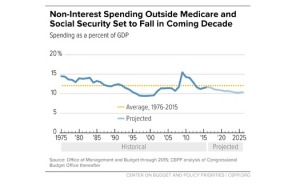
A new analysis suggests Medicaid and the Affordable Care Act are not straining the federal budget. (CBPP)
RICHMOND, Va. – Critics of expanding Virginia’s Medicaid charge the health program for the poor is unsustainably expensive.
A new analysis suggests it’s not. Although the federal government will pay for almost all of covering the working poor under Medicaid, the critics say the cost will rise until the federal budget can no longer afford it.
But Edwin Park, vice president for health policy at the Center on Budget and Policy Priorities, says the financing structure put in place under the Affordable Care Act, Obamacare, has worked as planned and looks stable.
In fact, he says Congress and the White House have almost never cut the program.
“Congress actually increased how much the federal government will pay for Medicaid to deal with the last two recessions,” says Park. “The only time there’s been a decrease was a temporary reduction during the Reagan administration.”
Thirty-one states now cover residents up to one and a third times the poverty level through Medicaid, an option under the health-care reform law.
In spite of warnings that health-care reform would leave the government doing more than it can afford broadly, according to the Congressional Budget Office the law actually is working to reduce the deficit compared with what would happen under repeal.
Isaac Shapiro, senior fellow with the CBPP, says the cost of all federal aid to low-income families has been steady over the long term.
He says in fact those programs have long cost less than the trillion dollars a year the federal government gives away in tax cuts for the upper income.
“Not all of that goes to the rich, but a large and disproportionate share does,” says Shapiro. “If you combine all low-income programs, they amount to less than these tax loopholes and tax expenditures cost.”
The CBPP has found the states that have expanded Medicaid have saved money by doing so. Edwin Park.
“States don’t have to spend as much on helping hospitals, services that go to low-income uninsured people like mental health services, so there can be a net savings to a state budget,” says Park.
Since the end of the recession, the overall federal deficit has fallen by nearly three quarters.




